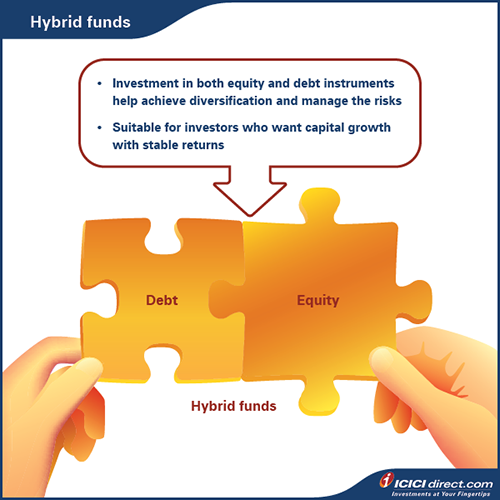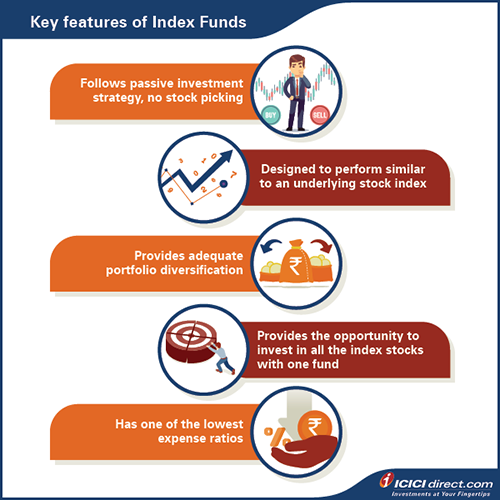Learning Modules Hide
Hide
- Chapter 1:Introduction to Mutual Funds
- Chapter 2: Advantages of Mutual Funds
- Chapter 3 : Regulation and Structure of Mutual Funds
- Chapter 4 : Mutual Fund Concepts : Part 1
- Chapter 5 : Mutual Fund Concepts : Part 2
- Chapter 6 : Types of Mutual Funds
- Chapter 7 : Basics of Debt Mutual Funds (Part 1)
- Chapter 8 Basics of Debt Mutual Funds: Part 2
- Chapter 9 : Duration and Credit Ratings in Debt Mutual Funds
- Chapter 10 : Types of Debt Mutual Funds
- Chapter 11 : Exchange Traded Funds: Part 1
- Chapter 12 : Exchange Traded Funds - Part 2
- Chapter 13 : Types of Mutual Fund Schemes
- Chapter 14 : Mutual Fund Investment Choices
- Chapter 15 : How to Choose Right Mutual Fund Scheme
- Chapter 1: Decoding the Mutual Fund Factsheet
- Chapter 2: Equity Mutual Funds – Evaluation-Part 1
- Chapter 3: Equity Mutual Funds – Evaluation (Part 2)
- Chapter 4: Equity Mutual Funds – Evaluation (Part 3)
- Chapter 5: How to Choose the Right Debt Mutual Fund
- Chapter 6: Mutual Fund Investment Choices – Switch and STP
- Chapter 7: Mutual Fund Investment Choices – SWP and TIP
- Chapter 8 - Mutual Fund Portfolio Management
- Chapter 9 Mutual Fund Return Calculations (Part 1)
- Chapter 10 Mutual Fund Return Calculations (Part 2)
Chapter 13 : Types of Mutual Fund Schemes
Thus far, we’ve got a fair sense that equity mutual funds are suitable investments for somewhat risk-taking investors. Then there’s debt mutual funds and ETFs for those who want to take lower risks.
But, sometimes you just wish for a more dynamic investment option which gives you the best of both worlds – adequate returns and managed risks. And Voilà! you have - HYBRID FUNDS.
Hybrid Mutual Funds
Hybrid schemes are mutual funds that invest across debt classes. This means that they may include equities, debt securities, or gold. The idea is to diversify across assets and industries. Since different assets tend to perform differently under various market conditions, the diversification helps achieve maximum returns while balancing risk as much as possible. For instance, in a market downturn, equities may give lower returns. However, gold value may appreciate. This ensures that the portfolio remains balanced.

Here are the different types of hybrid schemes to know about:
1. Conservative Hybrid Funds
Conservative hybrid funds are open-ended funds that invest a majority of their corpus in debt securities. This could go as high as 90%. The remaining is used to buy other assets, mostly equities. The higher debt securities ensure that returns are relatively stable while exposure to equities provides some room for growth opportunities.
Do you remember?
Open-ended mutual funds are schemes where units can be issued at any time. This means you, as an investor, can buy and sell units as you like.
2. Balanced Hybrid Funds
These are open-ended funds that attempt to invest a fixed ratio of assets in equity and debt instruments. For instance, a balanced fund could aim to invest 60% of total assets in equity and equity related instruments and the remaining 40% in debt instruments. Balanced funds work well for investors who have a medium-term investment horizon with a need for safety as well as capital appreciation.
3. Aggressive Hybrid Funds
These are open-ended funds that invest largely in equity and equity-related instruments. Think of them as the opposite of conservative schemes. Investment in equities could go as high as 80%. Investors who want high returns but still want some amount of safety can choose aggressive hybrid funds.
4. Balanced Advantage Funds
Balanced advantage funds or dynamic funds invest in equity and debt schemes, but there is no set ratio. Fund managers change up the investments depending upon market conditions. For instance, balanced advantage fund manager could increase equity investments when markets are low to take advantage of lower prices. If you are an investor who wants to take advantage of market changes, then this scheme is a good option. Just make sure to choose a reliable fund.
5. Multi Asset Allocation Funds
Multi asset allocation funds are like a box of chocolates with different flavours. These schemes go beyond equity and debt assets. They invest at least 3 assets classes with a minimum allocation of 10% each. Most often, the third asset is gold. This is perfect for investors looking for a highly-diversified fund.
6. Arbitrage Funds
Arbitrage is the practice of simultaneously buying and selling assets or securities in different markets to take advantage of price differences.
You know how you compare prices of, say clothes, in different shops or cities? If clothes in one city are cheaper, then you could buy from there and sell in another city where clothes are more expensive. This is the basic idea behind arbitrage funds.
These are open-ended schemes take advantage of such arbitrage opportunities in different markets. Arbitrage mutual funds take a position between the cash and derivative markets to make profits. They are similar to equity oriented mutual funds from the tax perspective, in the sense that at least 65% of assets invested in stocks. Arbitrage funds can be a good option for investors looking to park surplus money for the short term.
7. Equity Savings Funds
Equity savings funds are once again like a box of chocolates. Only, they invest in equity, debt as well as arbitrage opportunities. These funds invest a minimum 65% of total assets in equity and equity related instruments and a minimum 10% of total assets in debt instruments.
Solution-Oriented Schemes
Some people are good planners. They invest for a long-term goal. Take Raghu, a middle-aged man we know, for instance. He’s been planning his retirement for years! Is there a way to invest in mutual funds for specific goals?
Yes! That’s where solution-oriented schemes come into play. These schemes are designed for a specific financial goal. They are typically long term with a certain lock-in period to help fulfil investment objectives.
1. Retirement Funds
If you’re like Raghu and want to plan your retirement, then retirement funds are a good way to go! These are open-ended schemes with a lock-in of 5 years or till retirement age, whichever is earlier. There are different schemes offered, depending upon your risk appetite and retirement goals. Each fund has a different strategy.
2. Children’s Funds
For investors who want to secure the financial future of their children, children’s funds are an option. Once again, these open-ended funds have a lock-in period of at least 5 years or till the child attains majority age, whichever is earlier. You can invest in these funds for important milestones like your child’s higher education, marriage, etc.
Other Schemes
Index funds and Fund of funds are two other schemes you need to know about.
1. Index Funds
An index mutual fund invests according to an index. They invest in the same securities as the index and a similar proportion as well. For instance, ICICI Prudential Nifty Next 50 Index Fund invests in securities from the Nifty Next 50 index.
Index mutual funds follow a passive investment strategy. They’re a good option for investors who want to get returns similar to an index. Usually, such funds help with wealth creation in the long term. However, one thing to note is that the returns may be slightly lower than that of the index. This difference is because something called the tracking error.
- Tracking error refers to the difference a fund’s returns and the performance of a benchmark index because of different expenses involved in managing a fund, such as fund fees.
If you want to choose an index fund, then choose the indices first and then choose the fund which has minimum expense ratio and lowest tracking error.

2. Fund of Funds
Fund of funds invest in other funds. It’s an indirect way of making returns. These funds don’t have their own portfolio but invest a minimum of 95% of their assets in other underlying funds. It’s a hassle-free way of investing in multiple mutual funds by investing in a single fund!
However, here are some things to keep in mind when it comes to FoF investments:
- They attract double expenses: that of the underlying fund and then the fund you actually invest in.
- While they can offer diversification benefits, returns may be lower because of the higher expenses.
- They are more suited for long-term investment horizons. Don’t choose this fund if you have a short-term objective.
- FoFs are taxed as debt funds, meaning their tax implications are higher than equity funds, even though they carry indexation benefit.
Summary
- Hybrid mutual funds invest across asset classes like equities, debt securities and gold. The different kinds of hybrid mutual funds are:
- Conservative hybrid funds
- Balanced hybrid funds
- Aggressive hybrid funds
- Dynamic asset allocation or balanced advantage funds
- Multi asset allocation funds
- Arbitrage funds
- Equity savings funds
- Arbitrage is the practice of simultaneously buying and selling assets or securities in different markets to take advantage of price differences.
- For investors who want to invest with a specific goal in mind, solution-oriented mutual funds are an option. There are two kinds in India:
- Retirement funds
- Children’s funds
- The two other schemes to know about are index funds and fund of funds.
- Index funds are good for passive investing. Fund of funds give you a wider range of portfolios to invest in.
We’ve done a rundown of equity mutual funds, debt mutual funds, ETFs and even hybrid funds. Now, don’t you want to know the different ways to invest in them? We’ll explore that in the next chapter.
Disclaimer:
ICICI Securities Ltd. ( I-Sec). Registered office of I-Sec is at ICICI Securities Ltd. ICICI Venture House, Appasaheb Marathe Marg, Prabhadevi, Mumbai - 400 025, India, Tel No : 022 - 6807 7100.I-Sec acts as a Composite Corporate agent having registration number –CA0113. PFRDA registration numbers: POP no -05092018. AMFI Regn. No.: ARN-0845. We are distributors for Mutual funds and National Pension Scheme (NPS). Mutual Fund Investments are subject to market risks, read all scheme related documents carefully. Please note, Mutual Fund and NPS related services are not Exchange traded products and I-Sec is just acting as distributor to solicit these products. Please note, Insurance related services are not Exchange traded products and I-Sec is acting as a corporate agent to solicit these products. All disputes with respect to the distribution activity, would not have access to Exchange investor redressal forum or Arbitration mechanism. The contents herein above shall not be considered as an invitation or persuasion to trade or invest. I-Sec and affiliates accept no liabilities for any loss or damage of any kind arising out of any actions taken in reliance thereon. Investments in securities market are subject to market risks, read all the related documents carefully before investing. The contents herein mentioned are solely for informational and educational purpose.
 Invest
Invest







COMMENT (0)